Can We Truly Define Knowledge? Exploring Epistemology and Theories
VerifiedAdded on 2020/03/16
|5
|1948
|55
Essay
AI Summary
This essay delves into the complex question of defining knowledge, beginning with an introduction to the concept and the challenges posed by philosophers and epistemologists. It explores the meaning of "define" and "knowledge," highlighting the role of epistemology in understanding knowledge's definition, validity, and existence. The essay then categorizes knowledge into different types, including knowledge of facts, people, and skills, and analyzes the concept of knowledge. It discusses the tripartite theory of knowledge (justified true belief) and the debate between certainty, truth, and belief. The essay concludes by emphasizing the difficulties in defining knowledge and the importance of understanding the different aspects of epistemology. The essay also provides a detailed discussion on the difference between facts, truth and beliefs, and how they relate to an individual's perception of knowledge.
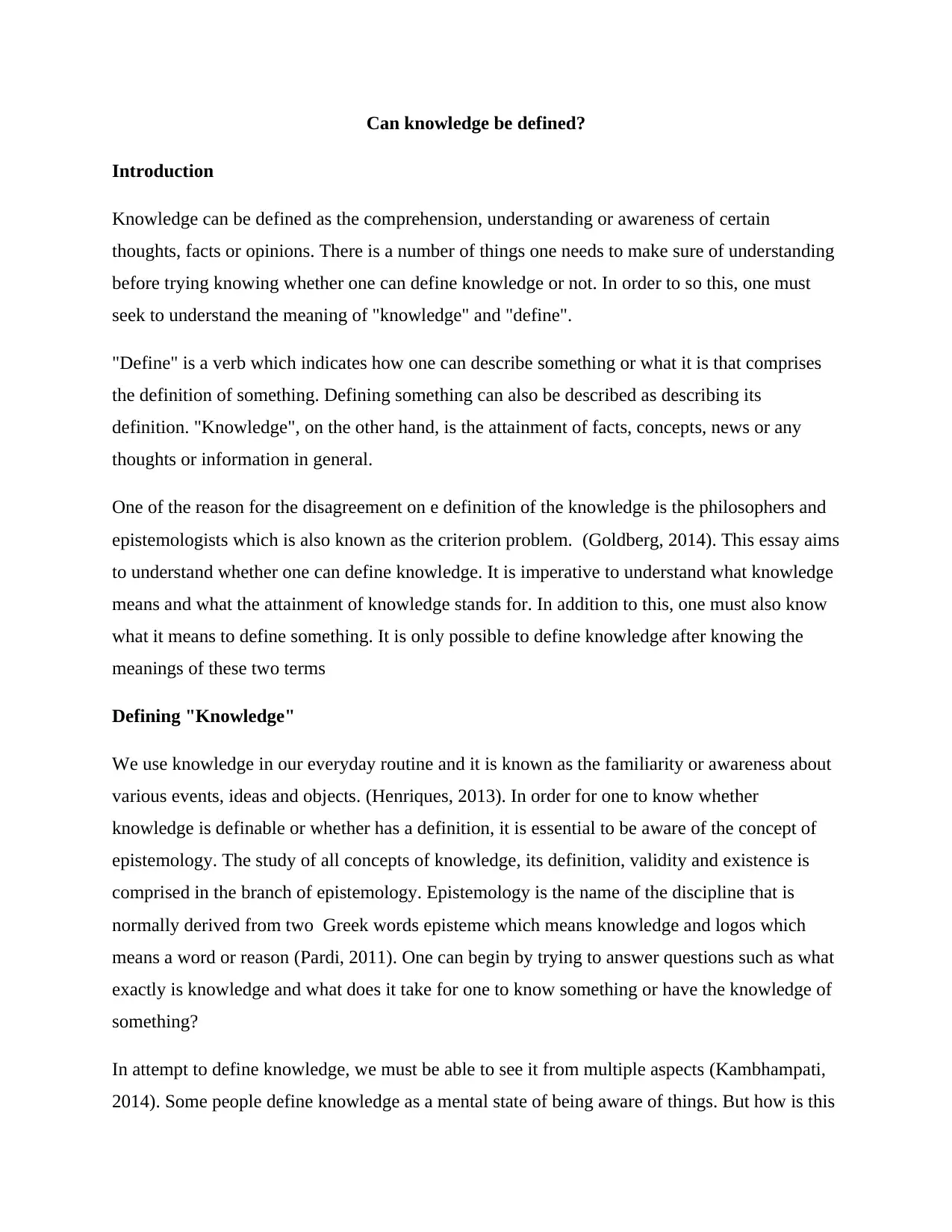
Can knowledge be defined?
Introduction
Knowledge can be defined as the comprehension, understanding or awareness of certain
thoughts, facts or opinions. There is a number of things one needs to make sure of understanding
before trying knowing whether one can define knowledge or not. In order to so this, one must
seek to understand the meaning of "knowledge" and "define".
"Define" is a verb which indicates how one can describe something or what it is that comprises
the definition of something. Defining something can also be described as describing its
definition. "Knowledge", on the other hand, is the attainment of facts, concepts, news or any
thoughts or information in general.
One of the reason for the disagreement on e definition of the knowledge is the philosophers and
epistemologists which is also known as the criterion problem. (Goldberg, 2014). This essay aims
to understand whether one can define knowledge. It is imperative to understand what knowledge
means and what the attainment of knowledge stands for. In addition to this, one must also know
what it means to define something. It is only possible to define knowledge after knowing the
meanings of these two terms
Defining "Knowledge"
We use knowledge in our everyday routine and it is known as the familiarity or awareness about
various events, ideas and objects. (Henriques, 2013). In order for one to know whether
knowledge is definable or whether has a definition, it is essential to be aware of the concept of
epistemology. The study of all concepts of knowledge, its definition, validity and existence is
comprised in the branch of epistemology. Epistemology is the name of the discipline that is
normally derived from two Greek words episteme which means knowledge and logos which
means a word or reason (Pardi, 2011). One can begin by trying to answer questions such as what
exactly is knowledge and what does it take for one to know something or have the knowledge of
something?
In attempt to define knowledge, we must be able to see it from multiple aspects (Kambhampati,
2014). Some people define knowledge as a mental state of being aware of things. But how is this
Introduction
Knowledge can be defined as the comprehension, understanding or awareness of certain
thoughts, facts or opinions. There is a number of things one needs to make sure of understanding
before trying knowing whether one can define knowledge or not. In order to so this, one must
seek to understand the meaning of "knowledge" and "define".
"Define" is a verb which indicates how one can describe something or what it is that comprises
the definition of something. Defining something can also be described as describing its
definition. "Knowledge", on the other hand, is the attainment of facts, concepts, news or any
thoughts or information in general.
One of the reason for the disagreement on e definition of the knowledge is the philosophers and
epistemologists which is also known as the criterion problem. (Goldberg, 2014). This essay aims
to understand whether one can define knowledge. It is imperative to understand what knowledge
means and what the attainment of knowledge stands for. In addition to this, one must also know
what it means to define something. It is only possible to define knowledge after knowing the
meanings of these two terms
Defining "Knowledge"
We use knowledge in our everyday routine and it is known as the familiarity or awareness about
various events, ideas and objects. (Henriques, 2013). In order for one to know whether
knowledge is definable or whether has a definition, it is essential to be aware of the concept of
epistemology. The study of all concepts of knowledge, its definition, validity and existence is
comprised in the branch of epistemology. Epistemology is the name of the discipline that is
normally derived from two Greek words episteme which means knowledge and logos which
means a word or reason (Pardi, 2011). One can begin by trying to answer questions such as what
exactly is knowledge and what does it take for one to know something or have the knowledge of
something?
In attempt to define knowledge, we must be able to see it from multiple aspects (Kambhampati,
2014). Some people define knowledge as a mental state of being aware of things. But how is this
Paraphrase This Document
Need a fresh take? Get an instant paraphrase of this document with our AI Paraphraser
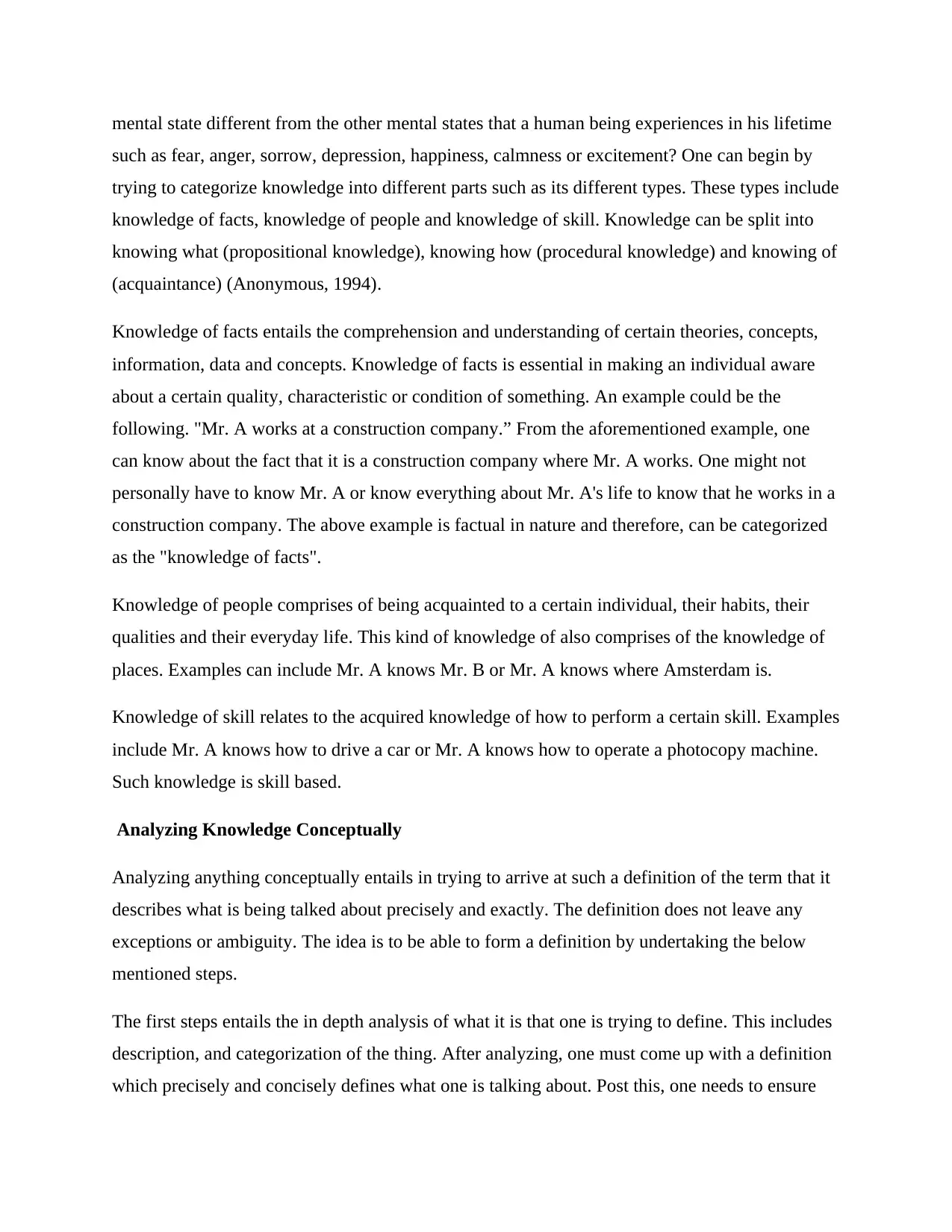
mental state different from the other mental states that a human being experiences in his lifetime
such as fear, anger, sorrow, depression, happiness, calmness or excitement? One can begin by
trying to categorize knowledge into different parts such as its different types. These types include
knowledge of facts, knowledge of people and knowledge of skill. Knowledge can be split into
knowing what (propositional knowledge), knowing how (procedural knowledge) and knowing of
(acquaintance) (Anonymous, 1994).
Knowledge of facts entails the comprehension and understanding of certain theories, concepts,
information, data and concepts. Knowledge of facts is essential in making an individual aware
about a certain quality, characteristic or condition of something. An example could be the
following. "Mr. A works at a construction company.” From the aforementioned example, one
can know about the fact that it is a construction company where Mr. A works. One might not
personally have to know Mr. A or know everything about Mr. A's life to know that he works in a
construction company. The above example is factual in nature and therefore, can be categorized
as the "knowledge of facts".
Knowledge of people comprises of being acquainted to a certain individual, their habits, their
qualities and their everyday life. This kind of knowledge of also comprises of the knowledge of
places. Examples can include Mr. A knows Mr. B or Mr. A knows where Amsterdam is.
Knowledge of skill relates to the acquired knowledge of how to perform a certain skill. Examples
include Mr. A knows how to drive a car or Mr. A knows how to operate a photocopy machine.
Such knowledge is skill based.
Analyzing Knowledge Conceptually
Analyzing anything conceptually entails in trying to arrive at such a definition of the term that it
describes what is being talked about precisely and exactly. The definition does not leave any
exceptions or ambiguity. The idea is to be able to form a definition by undertaking the below
mentioned steps.
The first steps entails the in depth analysis of what it is that one is trying to define. This includes
description, and categorization of the thing. After analyzing, one must come up with a definition
which precisely and concisely defines what one is talking about. Post this, one needs to ensure
such as fear, anger, sorrow, depression, happiness, calmness or excitement? One can begin by
trying to categorize knowledge into different parts such as its different types. These types include
knowledge of facts, knowledge of people and knowledge of skill. Knowledge can be split into
knowing what (propositional knowledge), knowing how (procedural knowledge) and knowing of
(acquaintance) (Anonymous, 1994).
Knowledge of facts entails the comprehension and understanding of certain theories, concepts,
information, data and concepts. Knowledge of facts is essential in making an individual aware
about a certain quality, characteristic or condition of something. An example could be the
following. "Mr. A works at a construction company.” From the aforementioned example, one
can know about the fact that it is a construction company where Mr. A works. One might not
personally have to know Mr. A or know everything about Mr. A's life to know that he works in a
construction company. The above example is factual in nature and therefore, can be categorized
as the "knowledge of facts".
Knowledge of people comprises of being acquainted to a certain individual, their habits, their
qualities and their everyday life. This kind of knowledge of also comprises of the knowledge of
places. Examples can include Mr. A knows Mr. B or Mr. A knows where Amsterdam is.
Knowledge of skill relates to the acquired knowledge of how to perform a certain skill. Examples
include Mr. A knows how to drive a car or Mr. A knows how to operate a photocopy machine.
Such knowledge is skill based.
Analyzing Knowledge Conceptually
Analyzing anything conceptually entails in trying to arrive at such a definition of the term that it
describes what is being talked about precisely and exactly. The definition does not leave any
exceptions or ambiguity. The idea is to be able to form a definition by undertaking the below
mentioned steps.
The first steps entails the in depth analysis of what it is that one is trying to define. This includes
description, and categorization of the thing. After analyzing, one must come up with a definition
which precisely and concisely defines what one is talking about. Post this, one needs to ensure
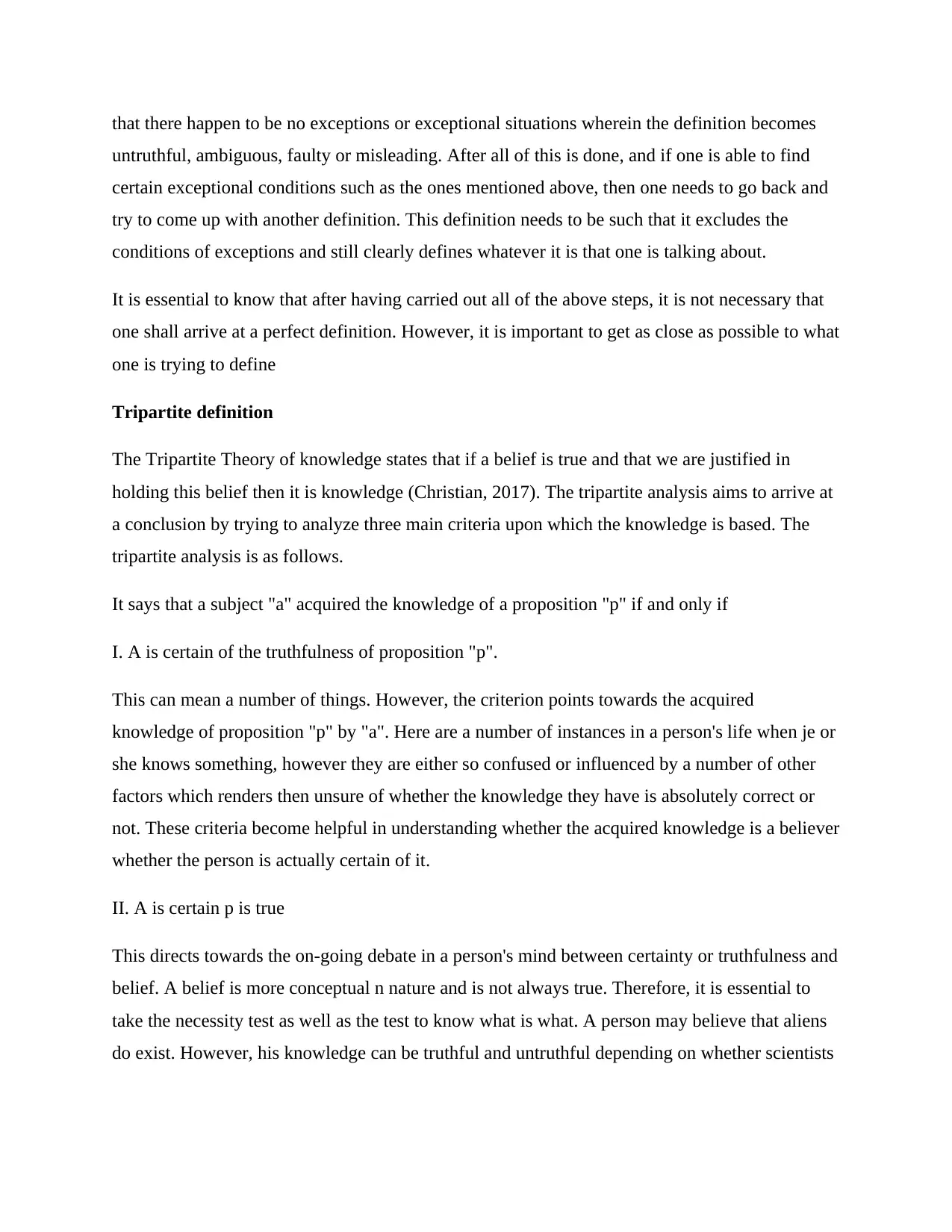
that there happen to be no exceptions or exceptional situations wherein the definition becomes
untruthful, ambiguous, faulty or misleading. After all of this is done, and if one is able to find
certain exceptional conditions such as the ones mentioned above, then one needs to go back and
try to come up with another definition. This definition needs to be such that it excludes the
conditions of exceptions and still clearly defines whatever it is that one is talking about.
It is essential to know that after having carried out all of the above steps, it is not necessary that
one shall arrive at a perfect definition. However, it is important to get as close as possible to what
one is trying to define
Tripartite definition
The Tripartite Theory of knowledge states that if a belief is true and that we are justified in
holding this belief then it is knowledge (Christian, 2017). The tripartite analysis aims to arrive at
a conclusion by trying to analyze three main criteria upon which the knowledge is based. The
tripartite analysis is as follows.
It says that a subject "a" acquired the knowledge of a proposition "p" if and only if
I. A is certain of the truthfulness of proposition "p".
This can mean a number of things. However, the criterion points towards the acquired
knowledge of proposition "p" by "a". Here are a number of instances in a person's life when je or
she knows something, however they are either so confused or influenced by a number of other
factors which renders then unsure of whether the knowledge they have is absolutely correct or
not. These criteria become helpful in understanding whether the acquired knowledge is a believer
whether the person is actually certain of it.
II. A is certain p is true
This directs towards the on-going debate in a person's mind between certainty or truthfulness and
belief. A belief is more conceptual n nature and is not always true. Therefore, it is essential to
take the necessity test as well as the test to know what is what. A person may believe that aliens
do exist. However, his knowledge can be truthful and untruthful depending on whether scientists
untruthful, ambiguous, faulty or misleading. After all of this is done, and if one is able to find
certain exceptional conditions such as the ones mentioned above, then one needs to go back and
try to come up with another definition. This definition needs to be such that it excludes the
conditions of exceptions and still clearly defines whatever it is that one is talking about.
It is essential to know that after having carried out all of the above steps, it is not necessary that
one shall arrive at a perfect definition. However, it is important to get as close as possible to what
one is trying to define
Tripartite definition
The Tripartite Theory of knowledge states that if a belief is true and that we are justified in
holding this belief then it is knowledge (Christian, 2017). The tripartite analysis aims to arrive at
a conclusion by trying to analyze three main criteria upon which the knowledge is based. The
tripartite analysis is as follows.
It says that a subject "a" acquired the knowledge of a proposition "p" if and only if
I. A is certain of the truthfulness of proposition "p".
This can mean a number of things. However, the criterion points towards the acquired
knowledge of proposition "p" by "a". Here are a number of instances in a person's life when je or
she knows something, however they are either so confused or influenced by a number of other
factors which renders then unsure of whether the knowledge they have is absolutely correct or
not. These criteria become helpful in understanding whether the acquired knowledge is a believer
whether the person is actually certain of it.
II. A is certain p is true
This directs towards the on-going debate in a person's mind between certainty or truthfulness and
belief. A belief is more conceptual n nature and is not always true. Therefore, it is essential to
take the necessity test as well as the test to know what is what. A person may believe that aliens
do exist. However, his knowledge can be truthful and untruthful depending on whether scientists
⊘ This is a preview!⊘
Do you want full access?
Subscribe today to unlock all pages.

Trusted by 1+ million students worldwide
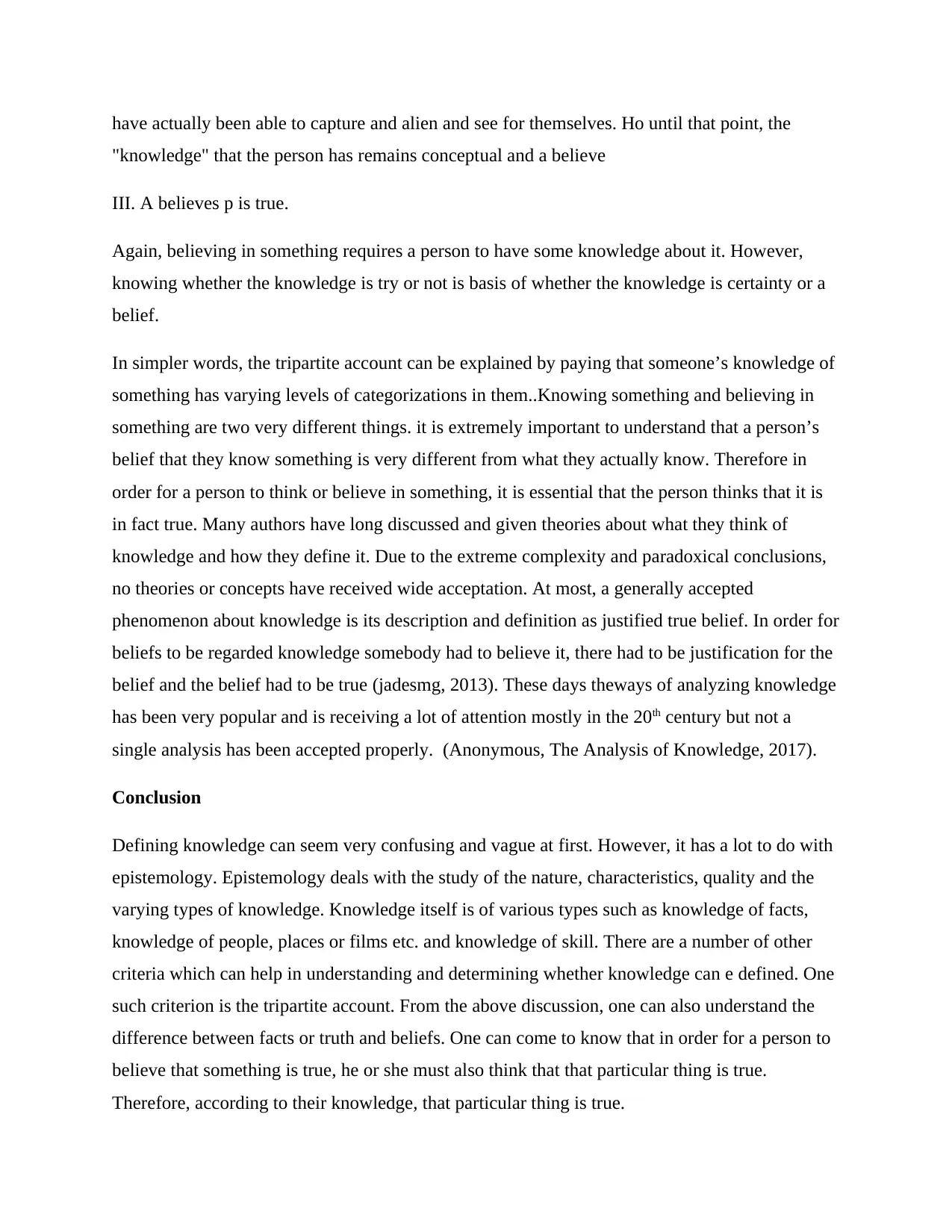
have actually been able to capture and alien and see for themselves. Ho until that point, the
"knowledge" that the person has remains conceptual and a believe
III. A believes p is true.
Again, believing in something requires a person to have some knowledge about it. However,
knowing whether the knowledge is try or not is basis of whether the knowledge is certainty or a
belief.
In simpler words, the tripartite account can be explained by paying that someone’s knowledge of
something has varying levels of categorizations in them..Knowing something and believing in
something are two very different things. it is extremely important to understand that a person’s
belief that they know something is very different from what they actually know. Therefore in
order for a person to think or believe in something, it is essential that the person thinks that it is
in fact true. Many authors have long discussed and given theories about what they think of
knowledge and how they define it. Due to the extreme complexity and paradoxical conclusions,
no theories or concepts have received wide acceptation. At most, a generally accepted
phenomenon about knowledge is its description and definition as justified true belief. In order for
beliefs to be regarded knowledge somebody had to believe it, there had to be justification for the
belief and the belief had to be true (jadesmg, 2013). These days theways of analyzing knowledge
has been very popular and is receiving a lot of attention mostly in the 20th century but not a
single analysis has been accepted properly. (Anonymous, The Analysis of Knowledge, 2017).
Conclusion
Defining knowledge can seem very confusing and vague at first. However, it has a lot to do with
epistemology. Epistemology deals with the study of the nature, characteristics, quality and the
varying types of knowledge. Knowledge itself is of various types such as knowledge of facts,
knowledge of people, places or films etc. and knowledge of skill. There are a number of other
criteria which can help in understanding and determining whether knowledge can e defined. One
such criterion is the tripartite account. From the above discussion, one can also understand the
difference between facts or truth and beliefs. One can come to know that in order for a person to
believe that something is true, he or she must also think that that particular thing is true.
Therefore, according to their knowledge, that particular thing is true.
"knowledge" that the person has remains conceptual and a believe
III. A believes p is true.
Again, believing in something requires a person to have some knowledge about it. However,
knowing whether the knowledge is try or not is basis of whether the knowledge is certainty or a
belief.
In simpler words, the tripartite account can be explained by paying that someone’s knowledge of
something has varying levels of categorizations in them..Knowing something and believing in
something are two very different things. it is extremely important to understand that a person’s
belief that they know something is very different from what they actually know. Therefore in
order for a person to think or believe in something, it is essential that the person thinks that it is
in fact true. Many authors have long discussed and given theories about what they think of
knowledge and how they define it. Due to the extreme complexity and paradoxical conclusions,
no theories or concepts have received wide acceptation. At most, a generally accepted
phenomenon about knowledge is its description and definition as justified true belief. In order for
beliefs to be regarded knowledge somebody had to believe it, there had to be justification for the
belief and the belief had to be true (jadesmg, 2013). These days theways of analyzing knowledge
has been very popular and is receiving a lot of attention mostly in the 20th century but not a
single analysis has been accepted properly. (Anonymous, The Analysis of Knowledge, 2017).
Conclusion
Defining knowledge can seem very confusing and vague at first. However, it has a lot to do with
epistemology. Epistemology deals with the study of the nature, characteristics, quality and the
varying types of knowledge. Knowledge itself is of various types such as knowledge of facts,
knowledge of people, places or films etc. and knowledge of skill. There are a number of other
criteria which can help in understanding and determining whether knowledge can e defined. One
such criterion is the tripartite account. From the above discussion, one can also understand the
difference between facts or truth and beliefs. One can come to know that in order for a person to
believe that something is true, he or she must also think that that particular thing is true.
Therefore, according to their knowledge, that particular thing is true.
Paraphrase This Document
Need a fresh take? Get an instant paraphrase of this document with our AI Paraphraser
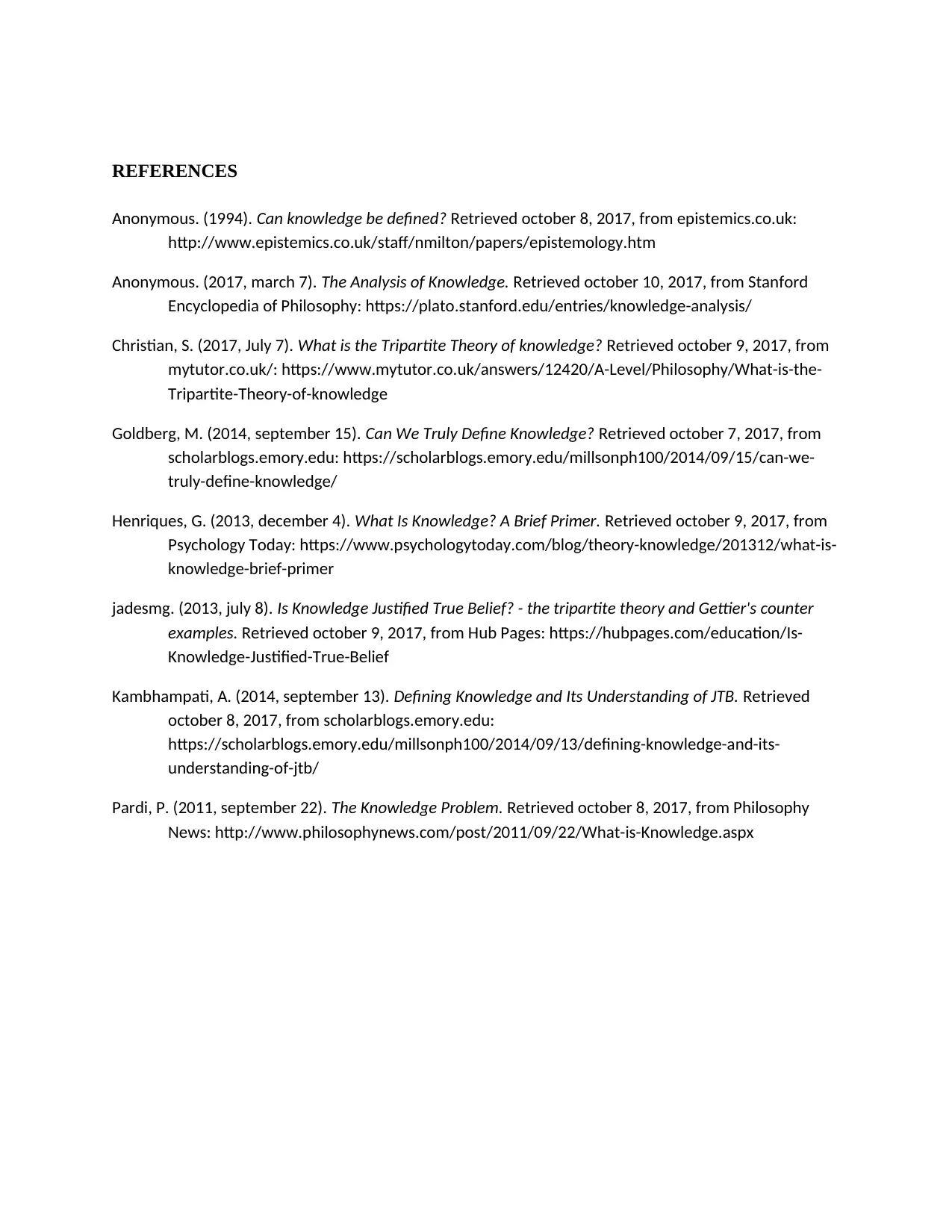
REFERENCES
Anonymous. (1994). Can knowledge be defined? Retrieved october 8, 2017, from epistemics.co.uk:
http://www.epistemics.co.uk/staff/nmilton/papers/epistemology.htm
Anonymous. (2017, march 7). The Analysis of Knowledge. Retrieved october 10, 2017, from Stanford
Encyclopedia of Philosophy: https://plato.stanford.edu/entries/knowledge-analysis/
Christian, S. (2017, July 7). What is the Tripartite Theory of knowledge? Retrieved october 9, 2017, from
mytutor.co.uk/: https://www.mytutor.co.uk/answers/12420/A-Level/Philosophy/What-is-the-
Tripartite-Theory-of-knowledge
Goldberg, M. (2014, september 15). Can We Truly Define Knowledge? Retrieved october 7, 2017, from
scholarblogs.emory.edu: https://scholarblogs.emory.edu/millsonph100/2014/09/15/can-we-
truly-define-knowledge/
Henriques, G. (2013, december 4). What Is Knowledge? A Brief Primer. Retrieved october 9, 2017, from
Psychology Today: https://www.psychologytoday.com/blog/theory-knowledge/201312/what-is-
knowledge-brief-primer
jadesmg. (2013, july 8). Is Knowledge Justified True Belief? - the tripartite theory and Gettier's counter
examples. Retrieved october 9, 2017, from Hub Pages: https://hubpages.com/education/Is-
Knowledge-Justified-True-Belief
Kambhampati, A. (2014, september 13). Defining Knowledge and Its Understanding of JTB. Retrieved
october 8, 2017, from scholarblogs.emory.edu:
https://scholarblogs.emory.edu/millsonph100/2014/09/13/defining-knowledge-and-its-
understanding-of-jtb/
Pardi, P. (2011, september 22). The Knowledge Problem. Retrieved october 8, 2017, from Philosophy
News: http://www.philosophynews.com/post/2011/09/22/What-is-Knowledge.aspx
Anonymous. (1994). Can knowledge be defined? Retrieved october 8, 2017, from epistemics.co.uk:
http://www.epistemics.co.uk/staff/nmilton/papers/epistemology.htm
Anonymous. (2017, march 7). The Analysis of Knowledge. Retrieved october 10, 2017, from Stanford
Encyclopedia of Philosophy: https://plato.stanford.edu/entries/knowledge-analysis/
Christian, S. (2017, July 7). What is the Tripartite Theory of knowledge? Retrieved october 9, 2017, from
mytutor.co.uk/: https://www.mytutor.co.uk/answers/12420/A-Level/Philosophy/What-is-the-
Tripartite-Theory-of-knowledge
Goldberg, M. (2014, september 15). Can We Truly Define Knowledge? Retrieved october 7, 2017, from
scholarblogs.emory.edu: https://scholarblogs.emory.edu/millsonph100/2014/09/15/can-we-
truly-define-knowledge/
Henriques, G. (2013, december 4). What Is Knowledge? A Brief Primer. Retrieved october 9, 2017, from
Psychology Today: https://www.psychologytoday.com/blog/theory-knowledge/201312/what-is-
knowledge-brief-primer
jadesmg. (2013, july 8). Is Knowledge Justified True Belief? - the tripartite theory and Gettier's counter
examples. Retrieved october 9, 2017, from Hub Pages: https://hubpages.com/education/Is-
Knowledge-Justified-True-Belief
Kambhampati, A. (2014, september 13). Defining Knowledge and Its Understanding of JTB. Retrieved
october 8, 2017, from scholarblogs.emory.edu:
https://scholarblogs.emory.edu/millsonph100/2014/09/13/defining-knowledge-and-its-
understanding-of-jtb/
Pardi, P. (2011, september 22). The Knowledge Problem. Retrieved october 8, 2017, from Philosophy
News: http://www.philosophynews.com/post/2011/09/22/What-is-Knowledge.aspx
1 out of 5
Related Documents
Your All-in-One AI-Powered Toolkit for Academic Success.
+13062052269
info@desklib.com
Available 24*7 on WhatsApp / Email
![[object Object]](/_next/static/media/star-bottom.7253800d.svg)
Unlock your academic potential
Copyright © 2020–2026 A2Z Services. All Rights Reserved. Developed and managed by ZUCOL.





